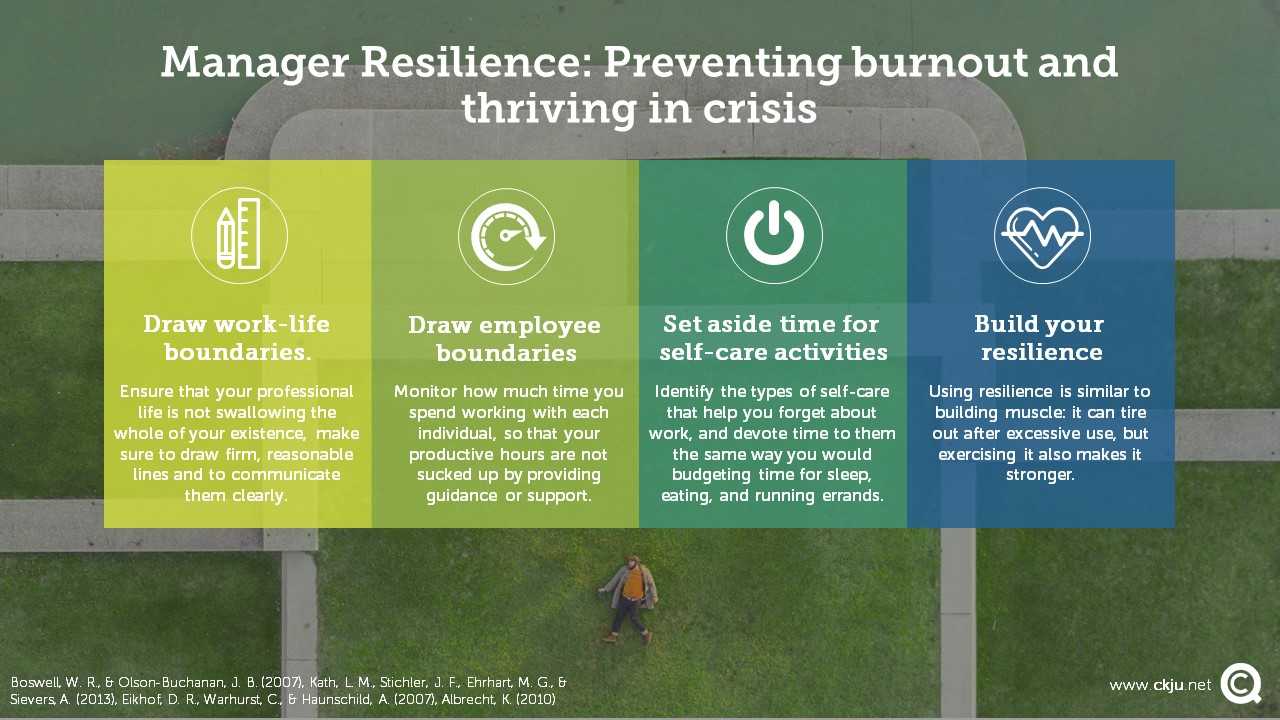- All Management Learning Resources
- Manager Resilience: Preventing burnout and thriving in crisis

Executive Summary
Managers are typically tasked with overseeing and taking steps to ensure the productivity of their employees. This task is complicated and requires a finely-tuned blend of providing motivation, doling out consequences, adapting to institutional change, and helping employees build independence and new skills (Shirey et al, 2010). At times, the multifaceted and complexity of this task leaves managers with little time to look after themselves.
While it may be tempting to ignore your own mental and emotional health, overwork can take a toll on managers just as easily as it can limit the effectiveness of employees (Albrecht, 2010). As a manager, looking after your own well-being and building your resilience must be a priority (Kath et al, 2012). You can help achieve this by taking the following research-supported steps: drawing clear work boundaries, engaging in self-care, and building your own resilience (Mohr & Puck, 2007).
Contents
Boundaries
A healthy and effective manager must draw boundaries between their work life and their personal life (Kath et al, 2012). There are many pressures that can cause your professional existence to encroach on your personal life, from demanding workplace transitions to employees that require a large degree of guidance; however, being able to step away from these obligations to take healthy breaks is paramount to maintaining a healthy and thriving career (Shirey at al, 2010). The topic of manager boundaries can be examined from two angles: work-life boundaries, and boundaries with employees. Below is a brief overview of the latest research on both topics.
Work-Life Boundaries. In some organizations, managers are tacitly expected to be reachable at all times. This may result in constant, compulsive email checking, an inability to release stress, fractured relationships with loved ones, and even physical health complaints (Kath et al, 2013). As a manager, you would know to step in and draw boundaries if you observed an employee overworking themselves to the point of illness; you may also need to exert this restraint with yourself.
To ensure that your professional life is not swallowing the whole of your existence, make sure to draw firm, reasonable lines and to communicate them clearly. For example, tell employees that you will respond to emails within 24 (or 48) hours, but that you will not send emails after 10pm (Boswell & Olson-Buchanan, 2007). Set aside regular “black out” periods during your work day, which you can devote to accomplishing solitary tasks; this can help keep meetings from swallowing up all your available time (Kath et al, 2012). Setting these boundaries and making them explicit can encourage your own employees to be healthy and expressive of their limitations, too (Albrecht, 2010).
Employee Boundaries. Some employees are more demanding than others. It is important to monitor how much time you spend working with each individual, so that your productive hours are not sucked up by providing guidance or support. Make sure that if an employee is struggling, you work with HR or other leadership to retrain them or empower them, so they can work more independently (Boswell & Olson-Buchanan, 2007). Set firm limits on yourself, in terms of the extent of the guidance you will provide; if an employee demands huge swathes of your time in order to be effective, they may not be a good fit with your organization.
Finally, make sure to set clear personal boundaries with your employees – be warm and friendly, but do not take responsibility for helping them cope with personal emergencies or life events. Spending time bonding with your employees is valuable and morale-boosting, but make sure not to erode respect for your leadership or exhaust yourself in the process (Eikhoff et al, 2007). Placing limitations on the times of day, or days of the week, that you respond quickly to emails or phone calls can also help draw recognizable lines in the sand.
Self-Care
As a manager, you probably spend so much time monitoring other people that you neglect to focus on yourself. While looking after other people is a defining aspect of your job, make sure that you do not neglect your basic, and ongoing, psychological and physical needs (Kath et al, 2013). All humans need time to relax, care for their bodies, and pursue interests that excite them. No matter how many people you are supervising, you deserve and require time to care for yourself (Albrecht, 2010).
Each week, set aside time for self-care activities that you find relaxing or stimulating (Eikhoff et al, 2007). This may involve stereotypical “self-care” activities like getting a massage or taking a bubble bath; however, it may also take the form of something like hiking or rock climbing, or playing a challenging video game (Denyes et al, 2001). There are many types of self-care, not just relaxation; feeling energized, challenged, or in awe of nature are all ways of giving yourself perspective and recharging your energy, too. Try to identify the types of self-care that help you forget about work, and devote time to them the same way you would budgeting time for sleep, eating, and running errands.
Resilience Building
In some ways, using resilience is similar to building muscle: it can tire out after excessive use, but exercising it also makes it stronger. To become a more resilient manager, then, you must engage in regular, challenging exercise, but also provide yourself time to rest and recuperate. This may involve seeking out external training that allows you to build new skills, or taking on new work responsibilities that are daunting (Albrecht, 2010). At first, you will find these new avenues of work demanding, even tiring to take on; however, as long as facing new challenges is combined with self-care and work-life boundaries, it will help you to thrive.
Effective managers continue to grow their skills throughout their careers (Lusch & Jaworski, 1991). Always be on the lookout for opportunities to grow. In addition to seeking out new skills, you can focus on identifying new “problem areas” in your workplace that you previously lacked the time or energy to tackle. Find ways to reorganize workflows, or reevaluate how teams are organized. The goal is not to achieve a state of organizational perfection, but rather to always be on the lookout for ways to make your workplace better. Paradoxically, taking on new responsibilities of this kind can empower you, and leave you feeling less like you are spread too thin, which can help you continue to deliver results to your organization for years to come (Mohr & Puck, 2007).
Key take-aways
- Managers should monitor their own exhaustion and burnout, just as they do with their employees
- Set specific limits on your work hours, and block out time where you will not take meetings or respond to emails. Make these boundaries clear to your team
- Monitor how much time you spend overseeing individual employees, to identify areas where additional training or boundaries may be necessary
- Identify activities that you find energizing, relaxing, or rewarding, and set aside time to engage in those self-care activities every week
- Build your resilience through a blend of seeking out new skills and challenges, and finding time to relax and recover
Management skills newsletter
Join our monthly newsletter to receive management tips, tricks and insights directly into your inbox!
References and further reading
Albrecht, K. (2010). Stress and the Manager. Simon and Schuster.
Boswell, W. R., & Olson-Buchanan, J. B. (2007). The use of communication technologies after hours: The role of work attitudes and work-life conflict. Journal of Management, 33(4), 592-610.
Denyes, M. J., Orem, D. E., & Bekel, G. (2001). Self-care: a foundational science. Nursing Science Quarterly, 14(1), 48-54.
Eikhof, D. R., Warhurst, C., & Haunschild, A. (2007). Introduction: What work? What life? What balance?: Critical reflections on the work-life balance debate. Employee Relations, 29(4), 325-333.
Kath, L. M., Stichler, J. F., Ehrhart, M. G., & Sievers, A. (2013). Predictors of nurse manager stress: a dominance analysis of potential work environment stressors. International journal of nursing studies, 50(11), 1474-1480.
Kath, L. M., Stichler, J. F., & Ehrhart, M. G. (2012). Moderators of the negative outcomes of nurse manager stress. Journal of Nursing Administration, 42(4), 215-221.
Lusch, R. F., & Jaworski, B. J. (1991). Management controls, role stress, and retail store manager performance. Journal of Retailing, 67(4), 397.
Mohr, A. T., & Puck, J. F. (2007). Role conflict, general manager job satisfaction and stress and the performance of IJVs. European Management Journal, 25(1), 25-35.
Shirey, M. R., McDaniel, A. M., Ebright, P. R., Fisher, M. L., & Doebbeling, B. N. (2010). Understanding nurse manager stress and work complexity: factors that make a difference. Journal of Nursing Administration, 40(2), 82-91.
About the Author







